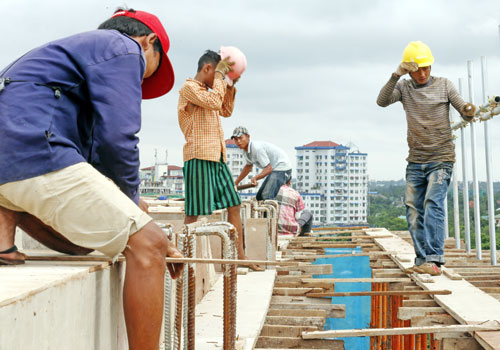 Construction and real estate industry officials are anticipating rising foreign demand for housing, office space and investment opportunities once the US sanctions are lifted. But an unstable policy environment could prevent the sectors from taking full advantage, they said.
Construction and real estate industry officials are anticipating rising foreign demand for housing, office space and investment opportunities once the US sanctions are lifted. But an unstable policy environment could prevent the sectors from taking full advantage, they said.
The number of foreign investors and expatriate workers in Yangon has risen dramatically in recent years, pushing up demand for office space and housing. Senior construction and industry officials think that the trend is only going to continue given the prospect of an end to most of the remaining US sanctions, which the US administration announced last week.
“There will absolutely be more foreign workers here [once the sanctions are gone],” said U Than Oo, deputy chair of the Myanmar Real Estate Services Association. “But they need office space and housing.”
Industry officials are hoping that this predicted fresh wave of demand will help enliven a residential property market that has cooled relative to the past two years.
U Khin Shwe, patron of the Myanmar Construction Entrepreneurs Association, is expecting an influx of expats – for employment and travel – once the sanctions are gone. “We need to build offices and houses for foreign businesspeople,” he said.
Foreign investment in real estate and construction is also likely to increase, U Khin Shwe said. State Counselor Daw Aung San Suu Kyi has been on several international trips to meet the heads of neighbouring countries, and there will be renewed interest from regional as well as US investors, he added.
But the construction sector is suffering from uncertainty about government policy, which could prevent the industry from meeting potential demand for new construction and attracting outside investment, senior officials said.
The government began a Yangon-wide review of high-rise buildings in May, which has dragged on for months. Instructions to some developers with near-finished projects to make drastic changes have since been partially rescinded. But the industry is spooked, and the fact that other projects still in the planning stages remain under review has made developers cautious about starting new projects.
Earlier this month Yangon City Development Committee told 55 developers that had a permit in principle – based on plans submitted to the previous government – to go back to the drawing board and make changes.
Other uncertainties include a Condominium Law parliament passed in January, which will allow foreigners the right to buy up to 40 percent of apartments in any given block. But U Khin Shwe pointed out that the by-laws for that piece of legislation – critical to defining the particulars of how foreign ownership will work – have still not appeared.
YCDC has also yet to release new building permit regulations, which will affect how developers apply for permission for certain projects, he added.
A long-awaited zoning plan – first drafted back in 2012 – is also expected to be opened for public comment later this year.
The net effect of this policy uncertainty is that developers are reluctant to begin new projects.
“Now is the time to build but the problem is this is not happening because policy is not stable,” said U Khine Shwe.
U Than Oo said although demand for expensive apartments to house expats is expected to grow, “the lack of stable regulation and policy means construction firms are scared to invest”.
“The economy isn’t stable either, but I suppose that will improve slowly,” he added.
The kyat has weakened steadily against the dollar in the last three months, pushing up the price of building materials, the vast majority of which are purchase from abroad in US dollar-denominated contracts.
U Ye Min, a spokesperson for Yangon Regional government, said that the draft zoning law would be published soon. Meanwhile, the government is also moving to finalise other new rules and regulations, he said. The regional government recently sent new building rules to YCDC for review, which concern things like parking requirements, fire resistance standards and how much space between buildings and the road must be left by developers.
“Once YCDC confirms they will announce [details of the] new regulations,” he told The Myanmar Times on September 19.
Quoted from mmtimes.